Jason Micheli's Blog, page 74
June 2, 2023
Q: Can We Find God in Nature?

Tamed Cynic is a reader-supported publication. To receive new posts and all content, consider becoming a paid subscriber.
Earlier this spring, my friend Ken Tanner finally managed to prod me into revisiting (his idea) and rewriting (my idea) a catechism of the faith which I had begun several years ago.
Here’s the 14th Question/Answer under the first rubric, God the Father.
Here is the previous post: How Should We Speak about God?
And here is the one before it: How Should We Picture God?
You can find the others in the Archive.
14. Can we find God in nature?Yes.
And no.
Yes:
Because God is the Cause of all existence and continually holds all things in their existence, every tiny mundane thing in creation is a sacrament of God’s love and grace, and creation— not nature— should be celebrated joyfully as a gratuitous sacrament of the God whose nature is love. Creation is so evidently the handiwork of the Lord its sacramentality became a rule of faith for Israel:
“Look at the heavens and the earth…and acknowledge that God made them.”
— II Maccabees 7.28
And no:
June 1, 2023
How Do You Identify False Prophets?
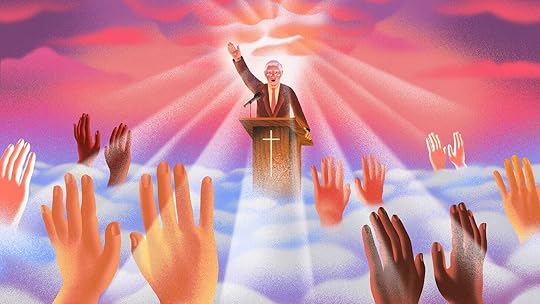
Tamed Cynic is a reader-supported publication. To receive new posts and all content, consider becoming a paid subscriber.
True confession time.
I have a particular sadomasochistic kink.
I cannot keep myself from doom-scrolling rightwing, self-professed Christian “prophets” that appear to be the only people still active on Twitter. Chief among these social media soothsayers is “Pastor” Julie Green whose CV reports that she’s an associate minister at Faith Family Fellowship Church in Davenport, Iowa. Her social media channels, however, present her as a spirit-filled prophet anointed on behalf of The Former Guy.
I dare you.
Take a gander at some of Pastor Green’s abundant “prophecies.”1
If the fullness of time should show that Julie Green is indeed a prophet of the true God, then evidently Yahweh’s investment in Hunter Biden’s laptop exceeds his concern for the children Russia has stolen from Ukrainian mothers.
I take it as quite obvious that, at best, Green is worshipping an idol unawares and, at worst, she and her ilk are grifters and charlatans.
But— fret not, this the reason for the essay— here’s the question for Christians:
How do you assess that this self-styled prophet (and those like her) is a false one?
How do you discern that the spirit she cites as her ecstatic authorization is not the spirit that is holy— the only spirit that is the Spirit of the Father and the Son?
In his first epistle, John instructs the church not to believe every spirit, “but test the spirits to see whether they are from God.” The exhortation is a clear indication that there are more spirits at work in the world than the Holy Spirit. Again, though, how do you so test the spirits? How do disciples distinguish between the spirit of _______ and the Spirit that is the third person of the Triune God? Remarkably, the task is not at all difficult for scripture straightforwardly supplies the criterion for discerning true prophecy.
Before proceeding, it’s critical to point out that after Pentecost prophet is no longer an office occupied by individuals. To Jews, the sure surprise of Luke’s account of Shavuot in the Book of Acts is that the Spirit, who heretofore had descended only upon individual leaders of Israel (e.g., Moses, Jeremiah, David) fell upon the whole body of believers. Just so, the church herself now holds the office of prophet because the Spirit who lavished herself so gratuitously at Pentecost persists in pouring herself out on all believers in word, water, wine and bread. Post-Pentecost, prophecy in the spirit is a communal work rather than the endeavor of anointed individuals. Pentecost alone is enough to disqualify many pretenders to prophecy.

With that caveat, here’s the first scriptural criterion for discerning true prophecy from false utterance on behalf of barren deities:
1. True prophecy gospels.Clearer discernment of legitimate prophecy requires a sharper understanding of scripture’s teaching of the third person of the Trinity. In continuity with the Old Testament, the Spirit in the New Testament continues to be the breath of life who can raise the dead and— even— animate statues (Revelation 11.11 and 13.15). The Holy Spirit, in other words, is the “ontological opposite of death.”2 Christ dies by the flesh and so do we die, but by the Spirit we all rise. The New Testament, then, understands the Holy Spirit Christologically.
Citing Acts 17.1, Robert Jenson writes:
“The Risen Jesus has a spirit as only a living person does and this spirit of Jesus simply is the spirit of prophecy.”
Christian prophecy is quite simply Christ speaking to those who gather in his name. Whenever true prophecy appears, it is the Risen Christ who sends his Spirit to create it. This is the plain teaching of scripture:
“Being therefore exalted at the right hand of God, and having received from the Father the promise of the Holy Spirit, he has poured out this that you both see and hear.”
— Acts 2.33
The Risen Christ speaks by the Spirit not only in our present but in Israel’s past. As Peter makes clear in his first epistle, the Hebrew prophets themselves were inspired to prophesy by “the Spirit of Christ'“ (1.11). In other words, the spirit that fell upon Jeremiah was the Spirit of Jesus. John gives us the most dramatic example of this Christ-centered doctrine of prophetic inspiration in his Apocalypse:
“For the testimony of/about Jesus is the spirit of prophecy.”
— Revelation 19.10
Clearly, part of our difficulty distinguishing true prophets from false ones is our lack of eschatological nerve when it comes to the inconceivably high claims scripture makes about Christ. When the Word of the Lord comes to someone in the Old Testament, it comes not as a stream of speech. It comes us as Jesus. Just so with prophecy, past and present.
Consequently, if what you hear does not sound like the Friend of Sinners and Prince of Peace who, while they were yet his enemies, died for the ungodly, then it’s not true prophecy.
The Holy Spirit enables and energizes gospel.As gospel, prophecy is therefore always in the mode of promise.Not prediction. And certainly not in the register of fear.Correlatively, gospel-telling does not need to become something “more” to be spirit-filled:
Where the witness to Christ is, there is the Holy Spirit.
Where the Holy Spirit is, there is witness to Christ.
There is gospel.
There the future is offered not as a threat but as a promise.
 2. True prophecy edifies the body
2. True prophecy edifies the bodyA sure tell that so many self-styled prophets today are false ones is their unabashed focus not on the Risen Christ’s body but on America. This is contrary to how the New Testament understands the prophetic office. We can see this in two decisive steps Paul makes in his correspondence with the Corinthians.
First, Paul make ecstatic seizure but one gift of many gifts grouped under prophetic activity:
“To one is given through the Spirit the utterance of wisdom, and to another the utterance of knowledge according to the same Spirit, to another faith by the same Spirit, to another gifts of healing by the one Spirit, to another the working of miracles, to another prophecy, to another the discernment of spirits, to another various kinds of tongues, to another the interpretation of tongues. All these are activated by one and the same Spirit, who allots to each one individually just as the Spirit chooses.”
— 1 Corinthians 12.8-11
Importantly, Paul identifies a common attribute that qualifies all these prophetic gifts of the Spirit.
They are only true prophetic gifts of the Spirit if they edify the body of Christ.This edification has a proper end too— unity.“To each is given the manifestation of the Spirit for the common good.”
Paul makes it plain two chapters later:
“Those who prophesy speak to other people for their building up and encouragement and consolation. Those who speak in a tongue build up themselves, but those who prophesy build up the church.”
— 1 Corinthians 14.3
True prophecy gospels because it is the Spirit of Jesus who authorizes prophetic speech. The Risen Jesus so speaks to two inextricable ends, the building up of his body and the uniting of it under his name.
Hence, as Paul writes in Romans, the charism in the charisms is love (12.9); therefore, the ultimate manifestation of the Spirit’s prophetic gifts is not religious experience or charismatic utterance but “love, joy, peace, patience, kindness, goodness, faithfulness, gentleness, and self-control.”
By this standard, today’s self-styled prophets bear strange fruit indeed.
 Read Tamed Cynic in the Substack appAvailable for iOS and AndroidGet the app1
Read Tamed Cynic in the Substack appAvailable for iOS and AndroidGet the app1You can read more about her in my friend, Diana Butler Bass’s post:
2Robert Jenson
May 31, 2023
Hitmen and Midwives

Tamed Cynic is a reader-supported publication. To receive new posts and all content, consider becoming a paid subscriber.
Hi Folks,
I started blogging over a decade ago on my friend Tony Jones’s advice. The discipline kept me from crazy when I was in the worst of stage-serious cancer, but after I returned from a year of medical leave, other I didn’t again take up the practice.
Writing, though, helps me work through the thoughts the Spirit gifts me as I struggle to discern what I must say in a sermon or in a Bible study. Just as importantly, the comments and questions it elicits from readers are an integral part of this process. Without any of you knowing it, for example, I have recently written sermons aimed at you.
I resumed the habit this winter here on Substack, and I’ve been bowled over by the thoughtful engagement and generous encouragement you all have provided and, in doing so, the community you’ve created.
So, thank you.
And if you have an idea for something you’d like to see explored here or something you’d like to see more of, let me know. Drop it in the comments or my inbox.
Okay, now to the post at hand.
— J
From Augustine’s tussle with Pelagius (the patron saint of Methodism) to Luther’s rumble with Erasmus to Paul’s anger at the false teachers in Galatia, heresy is nearly always a matter of pastoral concern rather than doctrinal minutiae. Quite simply, if the one who gospels believes his or her hearers are basically capable of keeping the commandments and living as Jesus lived, who need not Christ’s shed blood for our sins and Jesus’s own permanent perfect record as our only righteousness, then the preacher will proclaim not promise but glawspel.
Glawspel = A muddle of the gospel with the law.
And remember— the law kills.
Even when it is but a little leaven in a message that otherwise sounds gospel, the law kills. As Paul writes to the Galatians, any do attached to the message of done for you annuls the gospel. Such preaching, Paul tells the Corinthians, is a ministry of death.
How the preacher perceives his or her listeners thus determines the message.
Are they essentially little Christ’s in waiting, in need of exhortation, advice, inspiration, and instruction so that they can keep the commandments and build the kingdom?
Or are they sinners, doing what they want not to do and not doing what they want to do, in need of a promise of present mercy and future hope?
This is the decision at the heart of Thesis #5 on Preaching:
Preachers who assume a free will on the part of their hearers will always confuse law for gospel and will instead deliver advice, wisdom, or exhortation while also making the cross a mere adjunct to personal improvement or an exemplar of purposeful living.
If you want to check on the previous installments of this series on preaching, here are the previous theses, just click the link:
And here’s a session with Father Paul Nesta.
Finally, if you’re interested in the Heidelberg Disputation that Dr. Jones references in our conversation, my colleagues at Mockingbird have them collected HERE.
 Read Tamed Cynic in the Substack appAvailable for iOS and AndroidGet the app
Read Tamed Cynic in the Substack appAvailable for iOS and AndroidGet the app
May 30, 2023
In the name of the Father, Son, and the Holy Spirit- Mother of us all

Tamed Cynic is a reader-supported publication. To receive new posts and all content, consider becoming a paid subscriber.
On the liturgical calendar, the church now rests between Pentecost and Trinity Sunday.
The triune name of the true God reminds believers that there is no other God than the God who has identified himself with the particular history he has made with Israel and her servant Jesus. The God of Israel is the Father who raised that Son from the dead in their Spirit.
“Trinity” thus names an historical record.
More pragmatically, Trinity also serves as a linguistic rule, enabling Christians to speak of God as the scriptures do. God is Father not generically but because Jesus addressed HaShem as Abba— Daddy. God is this Son because the Father raised him up from death into his own life. God is the Holy Spirit because the Son promises to send the Paraclete as his own abiding presence. Just so, the way the Bible speaks of God presupposes that God is a community within Godself.
The Athanasian Creed has long supplied the basic pattern for Christian speech about God:
The Father is God, the Son is God, the Holy Spirit is God, but there are not three gods, only one God.
The three are one because of a rule articulated by Augustine, Opera trinitatis ad extra indivisa sunt: “The works of the Trinity toward the outside are indivisible.” Another important implication of the Athanasian Creed is that the three are not separate parts of one God. And so, there are only two nouns approved nouns for the three, persons or members. “That’s not because those words are so good,” Eugene Rogers writes, “It’s because all the other words are worse.” Father, Son, and Spirit are three persons not three parts.
The Triune God is three whos in one what.Christians address God as three-person’d because scripture so speaks of God. Easily the most important verse in scripture about the Trinity, Romans 8.11 makes plain the trinitarian shape of salvation, “If the Spirit of the One Who raised Jesus dwells in your mortal bodies, you too will be raised from the dead.” Rogers recommends reflecting on this promise in reverse.
You too will be raised from the dead— this is salvation.
You will be raised from the dead if the Spirit dwells in your mortal body— salvation, like prayer, begins with the Spirit.
The Holy Spirit thus connects us to the One who raised Jesus, i.e., the Father.
The result is Christ-likeness.
Scripture then gives us no other way to name God but this three fold narration.
Needless to say, this triune name is also clearly gendered.Given the way this gendered language has been— and continues to be— misused by the church and her leaders, it’s important to understand what they ancient church took for granted. For starters, unlike the pagan gods the God of the Bible creates ex nihilo, without using any preexisting material; therefore, by definition God cannot correspond to any human or created category.
Deus non west in genre, the ancient church said, God is not in any category.
The ancient principle yields a contemporary application, God is not in a gender.
May 29, 2023
God is Not a Fan of War

Tamed Cynic is a reader-supported publication. To receive new posts and all content, consider becoming a paid subscriber.
Cory Culver has been a friend and a parishioner for longer than I know. I recently asked him to speak at the Memorial Day service in my congregation. He did a remarkable job and I share it with you here.
Before I share my thoughts on Memorial Day, I believe I should establish my bona fides.
My name is Cory Culver. I served 23 years in the Navy and retired as a Commander. During that time I deployed 5 times as a helicopter pilot, saw much of the world except for South America, with most of those deployments to the Middle East during conflict.
Why is the church doing a Memorial Day service?
It is a secular recognition of service to the nation, not service to God.
It is understandable when people conflate the two— they share common themes— selfless sacrifice, adherence to a cause greater than one’s self. The idolatry of worshiping the state in the name of patriotism is seductive.
What we call Memorial Day began shortly after the Civil War when communities, mostly in the South, informally decorated the graves of the war dead with flowers. In 1868, the first formal recognition of Decoration Day happened just up the road at Arlington Cemetery, but it was more than 100 years later that the federal government made Memorial Day a national holiday.
The VA’s website describes the holiday as a day to “honor those who have died in service to the nation.” It is typically observed with nationalistic and patriotic traditions such as flags, uniforms, and military formality. More recently, in our American quest for heroes and meaning in a society that has a diminishing measure of both, it is becoming common for Memorial Day to be a celebration of all kinds of service— law enforcement, fire fighters, first responders, and even teachers. The more we rush to include all groups so everyone feels validated, the more we dilute what we remember these dead for— striving against fellow human beings and dying in the pursuit of this most un-human effort.
About five years ago, I attended the retirement ceremony of my Naval Academy roommate. During the benediction, his Catholic priest instructed the attendees:
“God blesses those who go to war in defense of their country.”
After the ceremony I asked him if he really believed that God blesses those who intentionally kill other people for their government and he assured me that God did.
I told him what I’ll tell you right now— that’s wrong.
God is not a fan of war. There is nothing honorable or glorious or holy about war. War is killing other human beings, created by God in his image, that have parents and wives and children just like us.We all know that the 6th Commandment forbids us from killing other people. The prophet Isaiah tells us that God will rebuke the nations and they will beat their swords into ploughshares, their spears into pruning hooks, and nations will not lift sword against nation, neither will they learn war anymore.
Throughout history, societies and religions have tried to deal with the moral dichotomy between what war requires and the human nature to abhor killing other people. In the Christian tradition, Saint Augustine originated the phrase “just war” or “jus ad bellum” which is “the right to war” as opposed to “jus in bello” which is “right behavior in war”. As a matter of fact, Augustine believed that not opposing a grave wrong even if it involved killing people was sinful.
In the 13th century, Thomas Aquinas reflected deeply on “just war” and defined a series of criteria that must be met for nations to engage in warfare. Over the centuries, Aquinas’ criteria have become four conditions for a “just war.”
It must be initiated by a competent authority that is accountable to the governed. In other words, dictatorships cannot initiate a “just war.”
It is conducted as a last resort after all non-violent options have been exhausted.
There is a reasonable chance that the objectives of the conflict can be realized. It is not “just” to kill other people for no reason other than to kill them.
It is only used to correct a grave, public evil and protect life – not for national self-interest or aggrandizement.
Four criteria that nations have used for centuries to justify killing other people. I don’t buy a word of it.I don’t believe that God will find that intentionally killing people is acceptable based on a human derived list of rules that make it easier for us to justify it. I don’t believe that when I do meet my maker he will say:
“Well Cory, a lot of people died because of things you did, but that’s OK, you did it for America. I never liked those Babylonians, uh Iraqis, anyway.”
No, these men and women whose graves we decorate today and countless brothers and sisters in arms with me will stand before God stained in the sin of what we have done.
But I also don’t live in an idyllic, pacifist ivory tower. Since the fall of man in the Garden, we have settled our disagreements with violence. In a world of limited resources, there will be conflict. Even if a people don’t want to fight, it will be forced upon them by an adversary that will bend Aquinas’ criteria any way possible and call it “just.”
Look at all of the lies Russia has told the world and their own people to justify invading their neighbor. Did Ukraine really have a choice? Either kill as many Russians as possible or stand peaceably by to be slaughtered, their wives tortured, and their children carried off to another country?
So how do we square this morally circular dilemma? Warfare is inevitable, it requires us to kill people, but killing is a mortal sin.
We can start as a church by not honoring the men and women whose graves we decorate today for service to their country, or for killing other humans to advance a national interest, but for sacrificing a part of their humanity and bear this sin before God so most of society didn’t have to.
Memorial Day observances typically recognize the fallen for “giving their lives,” but the reality is that they have sacrificed much more than that.
We can also stop trying to put God in a legal box that justifies what these men and women died doing. The good news is that their sacrifice of committing this sin for others is completely washed away by the sacrifice Christ has made to bear away all of our sins, including theirs.
What is the reason to try and justify their sinful actions in war if you truly believe that Christ has accepted us as sinners and alone justifies us before the Father?So let us, as Americans, retire to the hallowed ground where these men lie, plant flags and flowers, play Taps, and participate in other patriotic rituals befitting a nation that honors those that served the cause and died. But as a church, let us honor them for sacrificing their humanity and celebrate the good news that they do not need the justification of men, because they, like the rest of us, have been justified by Christ.
 Read Tamed Cynic in the Substack appAvailable for iOS and AndroidGet the app
Read Tamed Cynic in the Substack appAvailable for iOS and AndroidGet the app
May 28, 2023
No Martyrs, No Christianity
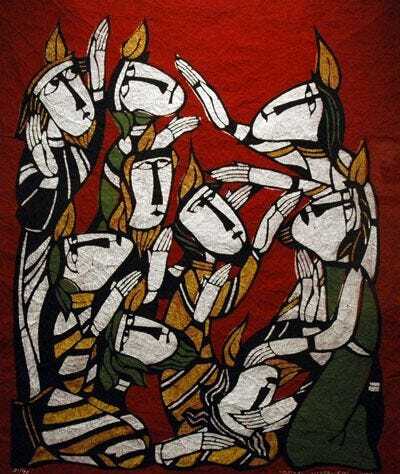
Tamed Cynic is a reader-supported publication. To receive new posts and all content, consider becoming a paid subscriber.
Pentecost
His mother learned of his martyrdom on Pentecost.
Father Christian de Cherge was a French Catholic monk and the prior in charge of the Abbey of Our Lady of Atlas in Algeria. He was beautified four years ago.
Christian De Cherge had served in Algerian as an officer in the French army during the Algerian War and, shortly after his ordination to the priesthood in 1964, he returned to the country to minister from the little abbey to the poor, mostly Muslim community of Tibhirine. De Cherge’s father viewed his son’s vocation with unmeasured disappointment. After all, their son was brilliant. He’d graduated at the top of his class and his future could have been bright, pursuing any career he chose.
Instead de Cherge felt called.
Along with his fellow monks, de Cherge toiled in relative obscurity for three decades, winning the trust of the poor and befriending leaders in the local Islamic government. When Islamic radicalism spread to Algeria in the early 1990’s, to the consternation of their superiors in Rome and to the anger of their families in Paris, de Cherge and his fellow monks refused to leave their monastery, because they refused to cease serving the community’s poor. To meet a violent end, they knew, might simply be the consequence of constancy to the Lord who had called them to such a place.
On January 1, 1994 a premonition came over de Cherge, a vision of his own impending murder. Indeed he and seven of his brothers from the Abbey were kidnapped and eventually beheaded by terrorists calling themselves the Armed Islamic Group. Anticipating his own murder, Christian composed a final testament and posted it to his family to be read upon his death.
May 27, 2023
Saved by Design

Tamed Cynic is a reader-supported publication. To receive new posts and all content, consider becoming a paid subscriber.
Here’s a conversation with architect and writer, Duo Dickinson.
Duo is an American architect who has built over 500 projects in 10 states over 30 years. His work has received more than 30 awards. His design work has appeared in over 70 publications including The New York Times, Architectural Recordand House Beautiful. He has written six books and is a contributing writer for Mockingbird, Common Edge, and Hearst Publications.
Here is the essay he reads at the top of the episode, When God was Not There.
Five and a half years ago, on my way into New York, a Peekskill, New York police officer told me they had found my sibling’s body, in her bed. She had not returned to work, where she never left, and was found lifeless in her home.
Her home had become a hoarder’s refuge, without access to the unusable bath and kitchen, filled with refuse. But when discovered it had carefully detoxed of her endless cigarette butts or rotting garbage amid feet of stacked refuse. Her careful preparation, included an opened letter from me from a decade prior (never answered, as no connection attempt ever was) laid open under a lit lamp over a pile of unopened notes from me was left for me to find. One last connection.
The picture above shows a 14 year old Win Dickinson in 1964. The year before he had quit the small private school my parents had supported for their children as the public schools, the schools my parents attended, were deemed “second rate” by them. My father had become Chairman of the school’s Board of Directors, and that day was handing out diplomas to the graduating 8th grade class. My brother’s class before he pleaded after 7th grade “I just can’t take it.” And, to my my parents, validated the ruling from his grades in grammar school that he was “second rate”. My parents let him quit, but forced him to attend what was to be his graduation. My sister was also in academic crisis, quitting The Master’s School a month before her high school graduation the year before, driving herself to California.
I was quietly in 3rd grade.
My parent’s world had failed them. Their children were not them, two Ivy League suburban survivors of Depression and World War 2. My brother came to have failed careers, college, marital and religious efforts. He told me once that “God showed me that He was my father.” He then, somehow, left the church he had devoted himself to. Somehow he had failed that Father, too.
In a last salvation, Winthrop fully transitioned (with the inheritance from the parents he failed) to become Pandora. And I never saw him again over the next 16 years. The carefully chosen home after transition (purchased from that inheritance) became untenable as a life spent buying all meals, none made, all clean clothes (dirty apparently tossed) and drinking a great deal consumed all his modest salary, leaving nothing for property taxes, as the rental income from his tenant disappeared too. The town was taking possession of the house the day the police found her body.
I know because I was the one left holding her life in my hands after death.
But God did not fail his children. His children, all of us, create the lives we live in. Those creations are ours, not His. And we are humans, whose central characteristic is that we know our failures and want to know God.
73 years ago, today, a baby was birthed. It’s perfection was just true. And our imperfections surrounded him, and us everyday. God does not fail us. We fail to be God. Somehow we think we, our children, the world, should be as Perfect as if we were the God who made us.
We are not.
 Read Tamed Cynic in the Substack appAvailable for iOS and AndroidGet the app
Read Tamed Cynic in the Substack appAvailable for iOS and AndroidGet the app
May 26, 2023
The Good News of Pentecost is the Gospel Itself

Tamed Cynic is a reader-supported publication. To receive new posts and all content, consider becoming a paid subscriber.
One of my first teachers of theology, Eugene Rogers, contends, counterintuitively in our culture:
"To think about the Spirit it will not do to think spiritually: to think about the Spirit you have to think materially…The Holy Spirit, who in classical Christian discourse "pours out on all flesh," has tended in modern theology and worship to float free of bodies.”
Indeed the proper starting point for understanding the Christian experience of and teaching about the Holy Spirit is Luke’s account of the Spirit’s outpouring forty days post Easter. Pentecost is likewise the necessary passage to understand how the Spirit’s work upon the Son’s disciples accords with the Spirit’s material effects throughout Israel’s scriptures.
In Acts, the Spirit’s work is not in the slightest spiritual.
The point in Luke’s reporting of Pentecost is not the arresting imagery of rushing wind and tongues of flame nor is it the linguistic miracle of so much confused speech nevertheless yielding understanding, an undoing of Babel. It’s straightforwardly clear in the text: the point of Luke’s Pentecost account is the biblical interpretation— the proclamation— the Spirit sets free.
Biblically, the Spirit moves in the world to effect material ends.For example:
In Exodus, Yahweh’s ruach blasts the armies of Pharaoh and drives back the waters of the Red Sea.
In Isaiah, Yahweh’s ruach dispatches Yahweh’s people to exile.
In Judges, Yahweh’s ruach falls upon Othniel; so that, he will set forth and war.
The self same Spirit empowers Moses to fulfill his role in the deliverance of God’s people from bondage in Egypt. When circumstances force Moses to delegate his responsibilities and share some of his Spirit with others, the immediate effect, Numbers 11 says, is that those upon Moses’s spirit rested began to utter prophecy.
In Israel’s Bible, the Spirit always moves in the world to effect material ends.
Prophecy, politics, and the leadership of God’s people— utterances that give life and wield judgment— are all inextricable works of God’s Spirit in the Old Testament. This is most evident in scripture’s record of Saul and David where charismatic experience (think: David dancing naked before the ark) and prophecy and political action are inseparable items of a single work of Yahweh’s ruach.
Consequently, a reader of Israel’s scriptures should notice that at Pentecost the Father and the Son in their Spirit alight not upon a solitary prophet but upon a whole gathering of people.
The disciples all become as David.
The gathering itself is like Gideon.
The church is now the prophet whose proclamation kills and makes alive.
At Pentecost, the Spirit pours Herself not upon a lone judge or a particular prophet or single king but upon the whole gaggle called church which, simultaneously, She has just created. Just so, the disciples of the Lord Jesus— Jews all— understood Pentecost as the fulfillment of a fundamental motif of their Bible: the coming of ruach Yahweh to make prophets, raise up judges, and elect kings.
May 25, 2023
The Sacrifice of War

Tamed Cynic is a reader-supported publication. To receive new posts and all content, consider becoming a paid subscriber.
That Pentecost so often elides into Memorial Day strikes me as a brute but appropriate reminder. The juxtaposition makes unavoidable the difference between the two polities, church and nation, and the liturgies that make each intelligible.
For instance, I remember several years when we took our boys to the Washington Nationals Home Opener. Before the game, the entire outfield was covered, like a funeral pall on a casket, with a giant flag. The colors were processed into the ballpark with priestly soberness. Wounded warriors were welcomed out and celebrated. Jets flew overhead and anthems were sung and silence for the fallen was observed. People around me in the stands covered their hearts and many, I noticed, had tears in their eyes. And it struck me that it felt like a kind of worship service.
There was even organ music.
And an elderly curmudgeon shushed a young family, which is as close to a worship service as you can get.
Mine was no great insight because just after the silence my oldest son said to no one in particular, “That was just like church.”
If there’d been an altar call my boys, my wife and I, and the Mennonite family 3 rows up might have been the only ones left in the stands.
Just so, it was a liturgy.
We were celebrating what’s been done for us and offering in return a sacrifice of gratitude and praise. It was a liturgy in that it was forming us into being certain kinds of people who view the world through a particular story— a story occasioned with song. It was preparing us, equipping us, to respond ourselves in a certain way if and when called upon. Looking up at the scoreboard at the pictures of fallen men and women— most of whom looked like kids still— I even had tears in my eyes.
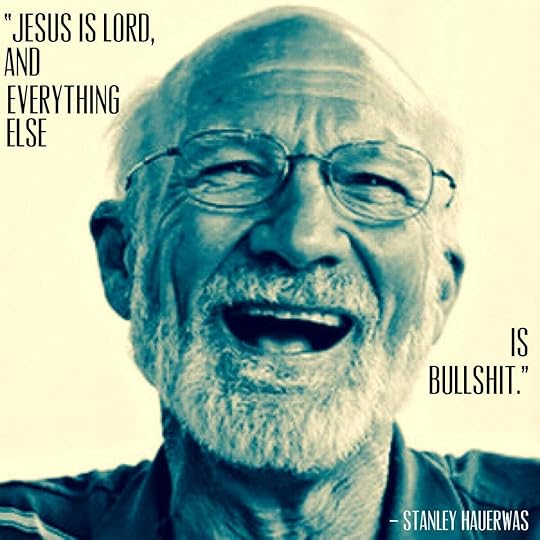 Thus, I exemplified Stanley Hauerwas’s warning that the danger posed by the presence of the American flag in Christian sanctuaries is that it’s an outward and visible sign more keenly felt than bread and wine and the Christ who hides himself there.
Thus, I exemplified Stanley Hauerwas’s warning that the danger posed by the presence of the American flag in Christian sanctuaries is that it’s an outward and visible sign more keenly felt than bread and wine and the Christ who hides himself there. As Lt. Col Dave Grossman notes in his book, On Killing: The Psychological Cost of Learning to Kill in War and Society, General SLA Marshall, in his study of men combat during the second world war, observed how out of every hundred men along a line of fire, during battle, less than a fifth of the soldiers would take part by actually firing their weapons at another human being.
Over three-quarters of the soldiers would do everything they could (short of betray their comrades) not to kill.This led General Marshall to conclude:
“The average, healthy individual has “such an inner and usually unrealized resistance to killing a fellow man that he will not of his own volition take life if it is at all possible to turn away from that responsibility.”
General Marshall’s observation is not merely a psychological insight. I believe it’s a theological insight confirmed by scripture, particularly Paul’s Letter to the Colossians.
May 24, 2023
At Pentecost, the Spirit Unites the Head with his Body
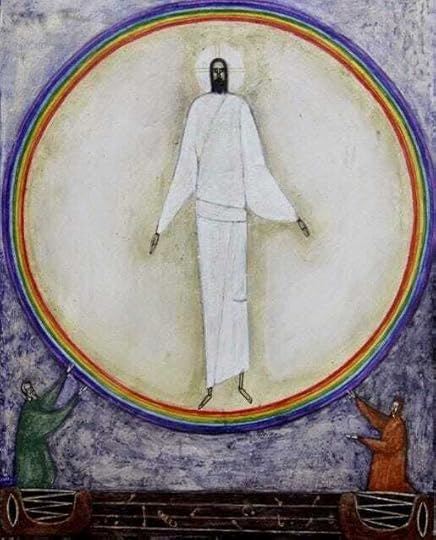
Tamed Cynic is a reader-supported publication. To receive new posts and all content, consider becoming a paid subscriber.
It’s common if cringey for local churches to celebrate Pentecost with birthday cakes and candles. In my very first parish, the congregation had a practice of singing “Happy Birthday” to the church on Pentecost. I gave that tradition a hasty and undignified funeral. In hindsight, though, I think there is accidental and unexamined wisdom in the cheesiness of flame orange sheet-cakes shaped like tongues.
The wisdom comes into view only by asking what may appear to be inconceivable and nonsensical questions.
What if the Father had raised from the dead not only the servant of Israel, Jesus Christ, but had raised also all the dead saints of Israel with the Son in the Spirit?
What if Easter had been the End and so no Pentecost and with it the revelation of “the Spirit’s face.”
If God had raised Israel along with her messiah and left Jesus’s disciples to wait for his return, then should we say that the Spirit would have ascended with the Risen Son?
The questions and the possibilities they pose about Pentecost point to what Robert Jenson characterizes as “the dramatic necessity” of Pentecost within God’s history.
The danger in understanding Pentecost merely as the church’s birthday is that it’s altogether too ordinary and natural. Creatures are birthed every moment of every day. However, the wisdom in the very same construal is the acknowledgement that with Pentecost something that heretofore was not now is.
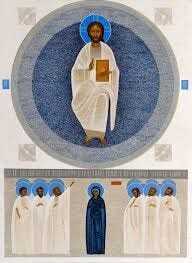
With Pentecost something that heretofore was not now is.
Karl Barth suggests the church starts with the thief at the Lord Jesus’s side who receives the promise of paradise. Many others, in positing Mary Magdalene as the first preacher and apostle (“I have seen the Lord!”) likewise place the advent of the church prior to Pentecost. The scriptures instead show a discontinuity between the post-Easter community of disciples and the church that is subsequent to the Spirit’s outpouring at Pentecost. As Robert Jenson writes:
“Pentecost is the Holy Spirit’s particular, personal initiative to delay the Parousia (the second coming).”
When the Holy Spirit descends eschatologically, as prophesied by Joel, but without raising the dead into the triune fellowship and ending this age, as anticipated by those same prophets, the time for the church is opened. A consistent critique of Western theology by the East centers precisely on Pentecost. Catholics and Protestants largely fail to acknowledge what the Orthodox Church sees as straightforwardly the witness of scripture.
Namely:
Pentecost is an intervention of the Holy Trinity that is new over and against the Resurrection and issues from the third person of the Godhead. Pentecost is a work of the Spirit not separate from the work of the Son but nonetheless distinct from it.Jason Micheli's Blog
- Jason Micheli's profile
- 13 followers



